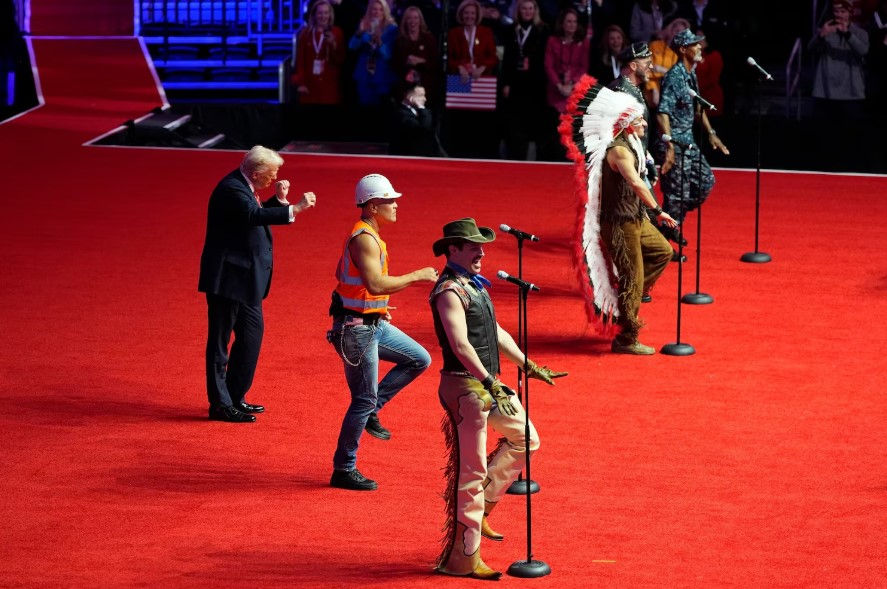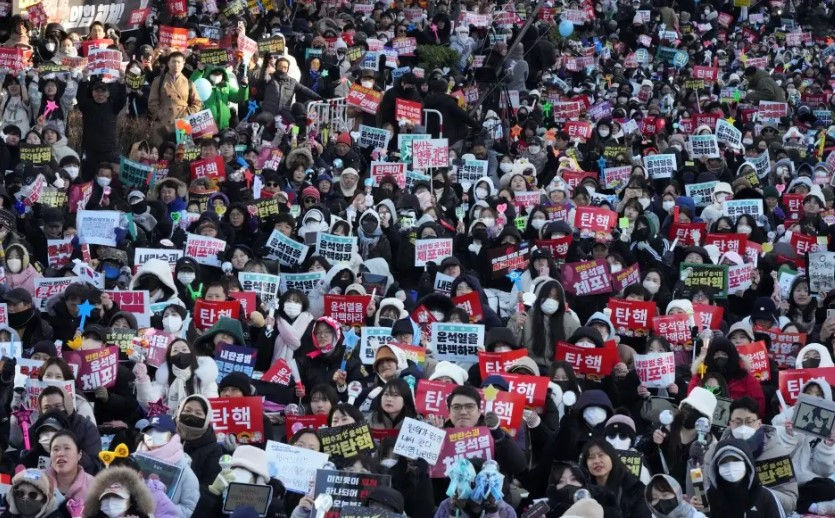How YMCA became Donald Trump's unlikely anthem
- Wonjeong Hong
- Mar 18
- 4 min read
Source
Article Summary
YMCA a song in the Village People’s album titled Crusin’. It is a disco song with uplifting beat that encourages the working class men find like-minded individual and companies at Young Men’s Christian Association hostels, which was often interpreted as picking up sexual partners at them, associating the song with gay culture since its release in 1978. However, the song is now closely associated with the US president, Donald Trump.
YMCA has became like a background and key music for Trump’s campaign, MAGA. Even Village People themselves announced that they will be performing at inauguration events. This is one of the biggest ironies in Trump’s short and contradicting political career.
Exuberant and catchy mood, and semaphore-like arm movements of the song, which were added for a TV performance in the American Bandstand in 1979, make people irresistible to join it. YMCA blended perfectly in people’s daily life that can be found everywhere, from wedding reception to aerobic classes.
It’s transition from parties to politics began after the single was certified as “culturally, historically, and aesthetically significant” song by the National Registry of the US, which means that the song is no longer subversive or progressive but only keeps the pure purpose of celebration and entertainment. A month after, the song was blasted out at anti-lock down rallies during the Covid-19 pandemic, and soon became a Donald Trump anthem. The significance of the song’s usage in MAGA campaign is that it brings populist ramadazz of rallies by turning their atmosphere like a sports match or rock concert. The crowd-friendly soundtrack energizes the crowd and encourage more people to actively participate in the rallies.
Furthermore, the nostalgic nature of the song fits well it the needs of the Trump’s supporters. They want the nostalgia of the old 70s when America was great, and relive certain moments in their past. The song’s portrait of the “still-admired images of American Masculinity”, also touches the sentimen of MAGAs, which can be observed from many office worker’s cosplay of water veterans, navy seals, and blue-collar workers.
The decision of Trump to choose this song, which is quite far away from the values, such as patriotism and freedom, that usual campaign song has, is also connected to his limited music choices. The list of artists, such as Beyoncé, Rihanna, Celine Dion, REM and Aerosmith had their lawyers send cease-and-desist letters, objecting Trump campaign to use their songs.
Although Victor Willis of the Village People was one of them, he changed his mind in recent years like other numerous people. He pointed out that the president’s use of YMCA in his campaign gave him profound financial benefit. Willis and his wife also announced that he will be suing any news organization describing YMCA as a ‘gay anthem’, which showes the songs complete transition of image from the symbol of progressive and subversive culture to the republican theme song. This choatic, ideological inconsistency also reflects Trump’s political career, full of contradcitions and mixed-up confusions.
Reflection
Overall, this article provides a funny background about the YMCA’s transition from a gay anthem to a Trump anthem. I did not know how the YMCA used to have subversive and progressive colors and used to represent gay culture. After realizing that, Trump’s extreme obsession with using the YMCA as his main campaign song felt quite ironic. However, it is understandable from another perspective, considering that Trump does not have various song choices due to the cease-and-desist letters from many artists.
I see numerous videos of Trump supporters dancing in the background with the YMCA on social media platforms such as TikTok and YouTube. The funny thing is they are all white, middle-aged men. Trump’s choice of YMCA as his anthem seems to be one of his key strategies to connect to his supporters by bringing up the old nostalgia of the old-great America—when everything was great—at least for the primary demographics of the Trump supporters: white, middle-aged men who were free from the low civil rights of minority groups during the 1970s.
The fact that Victor Willis of the Village People changed his view about Trump’s use of the YMCA during his campaign because of the amount of profit it brought felt bitterish. Of course, it’s all about the opinion of the original creator at the end, but Willis’ complete change of his stance and announcement to suit any organizations describing YMCA as a “gay anthem” was disappointing and seemed to be ignoring all the history and cultural legacies of the song. On the other hand, I also felt that the situation regarding YMCA’s political use reflects the current American society, where capitalism and political power control popular culture and industry.
The politics in the modern day is full of controversies and contradictions. JD Vance, who was against Donald Trump last year, changed his mind and is now his vice president; RFK Junior, who is known for his anti-vaccine view, has now been assigned as a health secretary, and Elon Musk, who used to support the democratic party is currently one of the biggest supporters and sponsors of Donald Trump. YMCA’s dramatic political transition is one of them, showing how political situations can profoundly influence pop culture. From the icon of the gay movement to the republican anthem, what is the destiny waiting for the YMCA, and how would the YMCA be recorded in later history? Only time will tell.




Comments